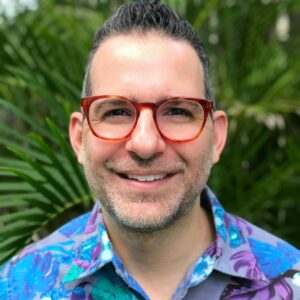Aaron Sickel
Assistant Professor

"The co-teaching model not only enriches the learning experience, but allows the candidates to get advice and support from a wide range of professors with diverse experiences and expertise."
Hometown
St. Marys, Kansas
Department
School of Teacher Education - Elementary
What is your current position?
I serve as cohort coordinator and field supervisor for the ESEE program, and teach methods courses in mathematics, science, and STEM across several program tracks.
How did you first become interested in teaching?
I became a teacher because I wanted to emulate the educators I had while growing up, including my parents. I felt that teachers had incredibly important jobs. I was fortunate to be taught by dedicated and effective teachers, who intentionally developed their students’ skills related to critical thinking, leadership, communication, and collaboration. Observing the commitment and passion from my own parents, who spent their entire careers as public school teachers and were greatly admired in the community, must have been the most significant influence for me. I view my role as an educator, first and foremost, to be a person who cares for the entire well-being of my students. I developed that perspective from watching my parents work with their learners.
What types of candidates do you hope/recommend to pursue the BEd ESEE program?
From my experience, people who choose to be elementary teachers feel a deep sense of wanting to help young children develop a strong educational foundation to be successful, committed, life-long learning citizens. I believe ESEE is especially suited for those candidates who want the flexibility to pursue positions across both general and special education. As so many of our graduates have attested, developing their knowledge of special education helped them become a more effective general educator, and vice versa.
How does this program best support and prepare its students?
With most courses being co-taught by two professors, I have found that candidates benefit greatly from working with our faculty. The co-teaching model not only enriches the learning experience, but allows the candidates to get advice and support from a wide range of professors with diverse experiences and expertise. In addition, candidates will engage in diverse school contexts across both general and special education with experienced mentor teachers.
What do you love most about the program?
I have really appreciated the sense of community and ‘ohana in ESEE. It is a supportive and caring environment for everyone involved. I also enjoy the unique design of methods courses that focus on subject integration. For example, we have a course that integrates social studies with performing arts and another course that integrates science, technology, engineering and mathematics (STEM).
What words of advice would you give to people looking to pursue the program/profession?
I have found that being an educator is more enjoyable and enriching when you collaborate and learn from other educators. My advice has always been to integrate yourself into education communities. All of the College of Education programs have been incredibly successful with supporting that goal!
Describe your own road to higher education.
I always knew I wanted to pursue higher education. However, I was nervous about my own abilities to succeed in each degree program, whether it was my freshman year as an undergraduate, my first year during a master’s program, or when I started working on my Ph.D. At each step of the way, with focus, determination, and perhaps most importantly, a pursuit of support systems, I learned I had more capabilities than I once thought. A goal I have for my students is to arrive at a similar realization, because I’ve always found that people can truly exceed their own perceived limitations.
What do you like to do outside of education?
I enjoy playing the piano and exploring various restaurants, coffee shops and food trucks across Hawai‘i with my wife.
